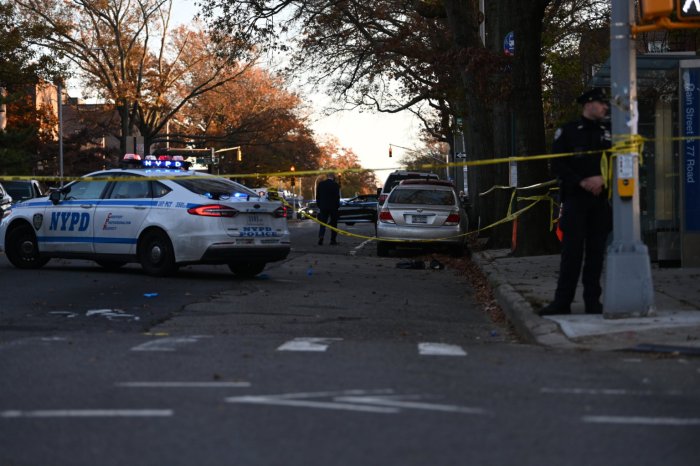By Thomas Tracy
What’s in a name? A lot, if it belongs to, according to some, “a raging anti-Semite.” Following a column in the New York Daily News that hit residents of Manhattan Beach with the strength of a bunker buster bomb, a push is on to rename Corbin Place now that it’s been revealed that Austin Corbin, the man the street was named after, was an outspoken anti-Semite and president of the American Society of the Suppression of Jews. “[Corbin’s] writings and rhetoric are totally unacceptable,” said City Councilmember Michael Nelson, who is leading the charge to have Corbin Place renamed. “In his statements against Jews, Corbin used the word ‘exterminate.’ That goes far beyond nasty words. It’s more along the lines of works like Mien Kampf.” “These kind of writings led to the Holocaust,” Nelson said, adding that it was “especially ironic” that Corbin Place is just a block away from the Holocaust Memorial Mall. “There’s even a little park triangle on Corbin Place called the Babi Yar triangle, which is in honor of those who perished in the Holocaust,” he said. “The majority of people living in the area are Jewish. It just doesn’t seem right to have a street, especially in our little corner of the world, named after this despicable character.” Apparently, the residents of Manhattan Beach aren’t students of history. If they were, they would have easily discovered what columnist Denis Hamill wrote about last week – that the railroad magnate who helped put Manhattan Beach on the map hated Jews. In the late 1800s, Corbin built the first railroads to the Town of Gravesend, which was later broken up into the neighborhoods of Manhattan Beach, Brighton Beach and Coney Island. Corbin is also credited with building several hotels in the area, including the Manhattan Beach Hotel, a premier vacation spot for millionaires, elected officials and the Broadway stars of the time. According to Hamill’s column, the Manhattan Beach Hotel was a spot “where John Phillip Sousa’s orchestra played patriotic tunes as the skies ignited with fireworks.” Jewish visitors, however, were barred from entering the hotel. According to historians, Corbin, who was also president of the Long Island Rail Road, continually spoke out against Jews and Jewish causes. According to an article in the Brooklyn Eagle that Hamill cited in his piece, Corbin said Jews “were a pretentious class who expect three times as much for their money as other people.” “They [Jews] are a detestable and vulgar people,” he repeatedly said in statements to the press. During one speech given at a meeting for the American Society of the Suppression of Jews, which was held at the tony Manhattan Beach Hotel, Corbin raised the question, “If America is a free country, why can’t we be free of the Jews?” According to the online encyclopedia wikipedia, Corbin’s anti-Semitism was so prevalent that it “provoked a denunciation by Henry Ward Beecher from his pulpit at Brooklyn’s Plymouth Church.” After their short history lesson, local elected officials and community activists were quick to demand that the street be renamed. “This is the best mechanism we have for sending a clear and compelling message that Brooklyn – which prides itself on tolerance and diversity – will not sanctify the memory of a devout anti-Semite,” said State Senator Carl Kruger in a statement. “It is unclear whether those who approved the original naming of Corbin Place many years ago were aware of the railroad magnate’s proud bigotry,” he said. “But all of us who share our deeply held belief in diversity, tolerance and decency look forward to the day when Austin Corbin can be erased, if not from our memory, but at least from our local street sign.” Nelson said that he had heard “rumors and rumblings” about Corbin’s checkered past, but never heard anything definitive until Hamill’s article. Neither did Community Board 15 Chair Theresa Scavo, who said that she too, was stunned by the news. “As soon as the Daily News hit the stands, that’s when the phone calls came,” she said. “Who really knew prior to that about Corbin? There are not many people out there looking up the histories of the people streets are named after.” But, overall, it doesn’t seem that the residents of Corbin Place have been shattered by their street’s dark past. Scavo said that she and Community Board 15 fielded about 15 calls from residents about Corbin Place after the Hamill article was published. Nelson said that upwards of 10 other residents brought the issue to his attention. Those numbers are just a drop in the bucket compared to the hundreds of residents who live on Corbin Place and the thousands more that live in Manhattan Beach. To make sure that the community is behind them, Nelson and Community Board 15 have sent a letter to all Corbin Place residents, seeking their input. As of this writing, members of Community Board 15 have scheduled a public hearing on renaming of the street on February 26. Scavo said that the street name can be decommissioned and renamed quite easily as long as local elected officials and the United States Postal Service are in agreement. “Most of the legwork has already been done,” she said. The change ultimately has to be approved by the City Council. Although nothing is set in stone, word has already spread that, once decommissioned, the street formerly known as Corbin Place could be renamed in honor of famed Nazi hunter Simon Wiesenthal or Theodore Herzl, the father of modern day Zionism. Some community activists are pushing to have the street renamed in honor of former State Senator Donald Halperin, a Manhattan Beach resident who died of lung cancer this past June. “To have a man like Donald Halperin replace a man like Corbin would be a good juxtaposition,” said Scavo. “You couldn’t find a person more devoted to Manhattan Beach.” Nelson agreed. “Personally I like that idea, but I’m a bit prejudiced because I went to high school with Don Halperin,” he said. Nelson believes that renaming the street in honor of Halperin would be a great tribute to the late legislator. “I just hope that would be the sentiment of a majority of the people in the community board,” he said.





























